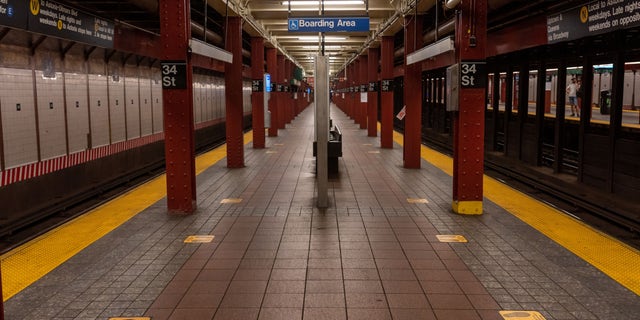A survey among mental healthcare professionals indicated significant issues resulting from the infectious-disease that could continue to plague individuals for years to come as the demand for therapy surges in a “second pandemic” of mental health problems.
Few would argue that the nearly two years of the pandemic have not been intense, but psychologists say the effect is more significant than previously understood.
Nine out of 10 therapists told The New York Times that the number of clients seeking care has risen to a level they haven’t seen before. Some professionals have waitlists of up to three months for a new appointment.

Soldier sitting on the sofa during psychological therapy
(iStock)
“Every single day there are new inquiries,” said Jacent Wamala, a marriage and family therapist in Las Vegas. “People are having to deal with the aftershock, emotionally and mentally, of what has happened.”
The lockdowns created a significant impact on individuals and couples alike, but different in each way: Some felt “isolation and separation,” while others started to recognize differences they could no longer avoid.
FAUCI WARNS OMICRON SURGE ‘INEVITABLE’ AHEAD OF HOLIDAYS
Nearly 75% of the professionals who took the Times survey said they spent a significant amount of time helping clients with family and relationship issues.
“It’s pretty difficult to find a therapist who does couples work who isn’t slammed,” said Chris Davis, a marriage and family therapist in Louisville, Ky. “It feels like more couples are on the brink of separating or divorcing. They’re fighting, their communication is negative, or it seems they’re just apathetic.”

NEW YORK, UNITED STATES – 2020/06/08: A nearly empty subway station platform is seen in Herald Square’s subway station on the first day of the city reopening.
(Getty Images)
Couples cited differences in parenting style, communication, division of household chores, and spending habits. Some couples also revealed they are “less attracted to each other” with no time to “miss and desire each other.”
Most concerning is the finding that child health issues have increased – something U.S. Surgeon General Vivek Murthy warned of earlier this month.
Dr. Pooja Sharma, a clinical psychologist in Berkeley, Calif. Said that “it might be some years before we have some sense of normalcy in mental health for children.”
Racial justice issues also topped the list for concerns among clients, with therapists saying that the murder of George Floyd and the spike in anti-Asian hate crimes drove new clients to seek help.

Side view of a young couple having an argument at home. File photo.
Montia Brock, a professional counselor in Pittsburgh, stressed that the pandemic may not have caused these issues, but it “definitely amplified the problems.”
The rise of acceptance of tools like telemedicine has helped to manage the surge in demand, but 28% of professionals said that they find it makes the sessions more difficult since they miss out on important body language cues and background noise can distract and muddy understanding.
LOW-DOSE PFIZER-BIONTECH VACCINE FAILS IN TRIAL ON 2 TO 5 YEAR OLDS
“An in-person office can help you slow down and provide a comfort that sometimes your home environment can’t,” Virginia-based professional counselor Christin Guretsky said.
The demand will not likely change heading into 2022, meaning this will remain the new normal for mental health professionals, but they are also suffering significant burnout: 10% of participants in the survey voluntarily raised the issue, with 20% overall reporting the need to cut back hours because they didn’t have time for home and personal demands.
CLICK HERE TO GET THE FOX NEWS APP
“We’re holding other people’s emotions, their sadness, their sorrow and their stress,” said Claudia Coenen, a certified grief counselor in Hudson, N.Y. “I saw four people today, and that’s about my limit. I’m on the edge of burnout, and I have to step back and trust that my clients will be OK.”
 Iktodaypk Latest international news, sport and comment
Iktodaypk Latest international news, sport and comment




